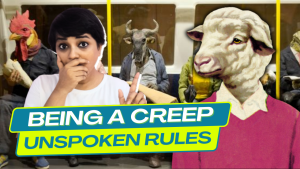In mathematics, you are always close-minded about calculative functions. You can’t learn anything new as of now. In algebra, you are close-minded about the formulas. Again, you can’t learn anything new as of now. But, in Statistics, to acquire statistical data of a huge population, you have to be open-minded, be open-to-learning many ways to consider. This could appear like comparing apples to peaches (and that is always possible) but let’s talk about what is being close-minded or close-to-learning, if you are closed-minded, and how to handle criticism!
Signs of being Close-to-Learning or Close-Minded
- You are accused of dismissing new information or ideas without considering them carefully.
- You are accused of always being right and never wrong.
- You are accused of being only interested in hearing information that confirms your existing beliefs.
- You are accused of being quick to judge others who have different beliefs than you.
- You are accused of not being interested in learning new things or expanding your knowledge.
Are you feeling sad already? Aww, don’t be! Let’s talk about it right? Feeling sad although is good, it talks about your receptibility, which is an essential component in the larger scheme of things to question your premise or that of others to explore the unknown and find your proximity to more suitable situations whether abstract or physical.
Now, let me help you challenge what you are told about not being an open-minded person because you are wired to give in to a state of authority without questioning the validity of the remarks passed on to you by others.
Challenging Remarks of being Close-Minded
No. 1// When you are accused of dismissing new information or ideas without considering them carefully. Is it possible that you are careful of your time, maybe you have a lot of experience, you know what is being spoken is run-of-the-mill, and you would rather use your wisdom to not repeat the mistakes?
No. 2// When you are accused of asserting your bias of always being right and never wrong, for me, it is hardly an argument because we are always responding to this moment of life. The perception of being always right could be as false memory as the acceptance of being always wrong. The person judging you at the moment, could also be the person who you can judge for the same.. It could be their false or imagined memory of always being right and never wrong? Them expecting a favorable response from you could be their need to confirm their bias, which could also be an issue, right?
No. 3// When you are told that you are only interested in hearing information that confirms your existing beliefs. You shouldn’t have a problem with the accusation just that it is not always, but humans predominantly want to hear things they are familiar with or are mentally prepared to encounter. It could be seeking existing beliefs to be confirmed or allow only as much space to new information, events, situations, based on your brain budget!
No. 4//You are quick to judge others who have different beliefs than you. Yea, you don’t have a lot of time to spend on a lot of people because if you are not quick in decision-making or in judgment based on the situation, it could indicate brain abnormality. Maybe you are also being judged too quickly based on that single interaction? A single interaction with a person can’t determine your whole life, discredit all the situations you have been through to be where you are today.
Finally, No. 5// You are not interested in learning new things or expanding your knowledge. Ok, practically you have only so many hours in a day for your productivity. When you are just okay, doing well, why would you be bothered to learn anything new that is incongruous to your existing interests and goals? Learning is important but we as humans over time learn it by ourselves things we gotta do to aid our jobs, to aid our personal development. Situations tell us. Isn’t it? So, overall you just have to ensure-
- you should be willing to admit when you’re wrong.
- be curious about different perspectives.
- seek information that challenges your existing beliefs.
- you be willing to have your perceptions changed.
- you be respectful to people even if you disagree with them.
These are the vital things answering to how to handle criticism when someone calls you being close-to-learning or close-minded.
How to Handle Criticism?
The point is every criticism you receive, don’t let that rattle you unless it is really derogatory, in which case, you have to strategize a suitable response. Learn how to handle criticism when people make random remarks on you, such as critiquing you in absolute terms such that you are always this or always that for one odd incident, which isn’t violent, or offensive, on social media or offline, such people are rather too quick to judge. If it hurts you see why you are hurt. Know in your heart that remarks they passed on you could very well reflect on them too because you know what clever and intelligent people don’t get into mean fights. Their brain seeks excitement over energy drainers. Does it make sense to you? This thought process has brought me much peace.




